Opinion
OF CONSPIRACY, CRITICISMS, AND WIKE’S AUDACIOUS ABUJA MAKEOVER

OF CONSPIRACY, CRITICISMS, AND WIKE’S AUDACIOUS ABUJA MAKEOVER
BY GILBERT BWANSHAK
In what looks like a carefully guided, fiercely forceful, and well-oiled campaign, there has been determined, deliberate efforts with the mandate to “pull down” and rubbish the person and works of the Minister of the Federal Capital Territory, Nyesom Wike. The one-line objective whose mandate is to de-market and make him unpopular, has remained dogged from timing and approach in achieving political mileage before, during, and after the “all important” National Executive Committee meeting of the Peoples Democratic Party, which held in Abuja. The unabated advocacy seems to have assumed a life of its own as anything, everything humanly possible is exploited to get the projected result.
So, in the past weeks, the media has been awash with opinions, analysis, and commentaries geared towards “pulling down” Wike. In most cases, admixture of jaundiced, unconvincing, distorted, and contrived stories and reports are rolled out. Arguably, as a result of the consistency of these attacks and innuendos, Wike has become the most trending name on the regular and social media. Unfortunately, the deluge of theatrical narratives and juvenile falsehoods released by some jejune, puerile, and out-of-trend leaders, and imaginary, comical, and faceless groups has defied every logic of reasonable thinking and moral standard.
To a large extent, the campaign seems to be the most attractive “cash cow” in the polity. With the speed at which people join the fray may have confirmed talks that pecuniary benefit is the driving force and not conviction. There are stories that an embattled Governor is allegedly bank-rolling the campaign, which has some double-faced personalities, and lawmakers with history of mercenary credentials as the “arrow-heads.” The modus operandi is to daily make, and sometimes invent disparaging statements against Wike to convey a “we-are-working” message to their pay master.
Despite the velocity of incongruous conspiracies, insidious criticisms, and consistent visibility in the media, the campaign is yet to achieve it’s purpose of soiling Wike’s credibility and crashing his political stock-value. The viciously wicked desire of making him lose track of realizing President Tinubu’s “Renewed Hope” agenda in FCT is not yielding results. Regardless the fiscal, physical, and human exertions, the table has not turned against the Ikwerre-born politician. Messages used are regurgitation of old, same and stale tales. Conveyers have believability and acceptability baggages. The concomitant result of this is continued failure.
Surprisingly, Wike is unruffled and unperturbed about the gale of attacks against him by political adversaries across the country, particularly from his home state. Like a battle-tested and war-veteran victorious general, he has stood up to every challenge. Often derided and deluded by political opponents who variously describe him as boastful, rabble-rouser, and crude but he has always shown, at the end of every battle that he is miles ahead of them. Not minding the coalition of forces, depth of controversies, and deep-seated animosity against him, Wike emerges triumphant. The ease, simplicity, and calmness he wins usually confounds dispassionate Nigerians, apolitical chroniclers of events, and objective opponents. How he has being able to combine these battles with the responsibilities of administering the FCT will make resourceful studies in political brinkmanship, hands-on leadership, and purposeful governance.
That his name featured on Tinubu’s ministerial nominees-list became subject of discourse among Nigerians. Some PDP members who still harbour the pains of losing the last presidential election which they attribute to “Wike’s intransigence” appeared worse hit. That he was deployed to the sought-after and heavily-coveted FCT generated bigger discourse within the polity. To some who see the portfolio as “birth right” largely due to unbroken appointments of their “sons” as successive ministers, Wike’s choice is classified an “anomaly and aberration.” Some members of the ruling All Progressives Congress, APC, keeps wondering why a prominent member of an opposition political party is given such juicy and sensitive position. To some PDP faithful, his appointment portends danger for the party, and it’s continued relevance in Nigeria’s politics.
Somehow, the writer is flummoxed about such loss of historical memory among many Nigerians, particularly “celebrated” columnists, politicians, and analysts. Could it be deliberate falsehood, mischievous misinformation or early stages of senility? That Tinubu, who upon declaration as president-elect promised to run “a government of national competence” went ahead to name Wike a member of his federal executive council is not new. Obasanjo, in 1999 did same in his “government of national unity.” He appointed leading opposition members into his cabinet. Late Chief Vincent Ogboluafor, prominent member of the All Peoples Party; which later became All Nigeria Peoples Party became Minister of Economic Affairs (later Special Duties); Late Senator Mahmud Waziri, who was a senior member of APP (ANPP) was named Presidential Adviser on Inter-Party Relations; Late Chief Bola Ige of the Alliance for Democracy was Minister for Power (later Justice). Like Obasanjo did in 1999, Tinubu replicated by enlisting people with requisite competencies and proven capacities into his government. In achieving this, party affiliation and political lineage took back stage.
Many Nigerians believed that between 2015 and 2023, many of the ministers in Buhari’s administration had low ratings in terms of service delivery in their respective areas of jurisdiction. However, Mohammed Musa Bello, immediate past FCT Minister may be in strong contention for the least performing minister award. Under his watch, the FCT experienced muted growth. The satellite towns were worse off. Lack of vision and negative political will largely contributed to the gargantuan infrastructural decrepit, inept bureaucracy, insecurity, and societal challenges that envelope the FCT. Some residents tend to believe that given his style of administration and body language, he may have exited as the worst occupier of that office.
Aware of the strategic position of Abuja in Africa’s leadership, and conscious of the need to make the city a befitting capital, Tinubu decided to do the right thing by posting Wike to the FCT. Also, given the glaring infrastructure deficit and multi-sectoral development challenges in Abuja, Tinubu may have settled for Wike, under whose tenure as Governor transformed Rivers to a modern, uniquely beautiful, and enticing state. Somehow,
the gregarious, sagacious, and indomitable spirit of Wike to assignments and relationship may have further worked in his favour. As the capital of Africa’s most-populous country, Abuja in dire need of transformation needed someone with experience and exposure to bring life to the city-centre and the satellite towns. That Wike ticks all the boxes is not in doubt. At every position; Local Government Chairman, Chief of Staff, Minister, and Governor his passion for hard work and commitment to effecting positive change has been obvious. He has always exhibited extraordinary skills, evolved uncommon leadership attributes, and recorded superlative strides at every juncture of his eminent public service career.
Drawing from his past experiences, Wike in few months has justified his five-star rating as “Mr. Project.” Abuja is now a huge “construction city” as numerous infrastructure works are going on simultaneously. Driving through the capital city, many construction firms are now involved with different projects. Unlike the comatose state under the last administration, the chain effect of this new development has been encouraging. Engineers, technicians, artisans, labourers, traders, drivers, food vendors and more now experience renewed activities and boost to their economic state and personal development. Residents and visitors to Abuja, on a daily basis see gradual transformation works on-going in Wuye, Asokoro, Berger, Wuse 2, Gwarimpa, Life Camp, Wuse, and other Districts. Bwari, Kuje, Abaji, Kwali, and other satellite towns and communities are not left out.
Prior to his assumption of office, the FCT was experiencing numerous security challenges. Kidnappings, violent robberies and negative occurencies became daily routine. From the city-centre to the satellite towns, people lived in fear, anxiety, and confusion. After weeks of planning, through the provision of security and surveillance systems, result-yielding synergies among security agencies, and requisite political will by Wike; with the huge support of Tinubu there is improved security in the FCT. His experience in education has also paid off in the sector. With special focus on capacity building, facilities and welfare, there is marked improvement in education. In addition to these, the massive promotion of staff, payment of outstanding allowances, arrears, and other emoluments, award of scholarship to over 130,000 indigent students, and on-going construction and upgrade of over 50 public secondary schools has energized the sector. Not forgetting the on-going facelift of Gwagwalada, Wuse, and Gwarimpa General Hospitals, just as Nyanya and Asokoro are expected to commence soon, and that of Utako will follow as every contractual infractions has been resolved.
It must be stated that the accelerated infrastructural upgrade and projects construction in the FCT is largely attributable to Wike’s ingenuity and wholesale-support of Tinubu. Replicating the Rivers model, he was able to convince and got presidential approval for the removal of the FCT from TSA, and commitment of FCT’s IGR to many of these projects. Also, he got Tinubu’s go-ahead to create the FCT Civil Service Commission; appointment of the Chairman and Board Members of the Commission; appointment of FCT’s Head of Service and 10 Permanent Secretaries. A legislation to these bureaucratic changes was said to have been passed in 2018 by the National Assembly but suffered implementation hiccups largely due to lack of political will by the previous administration. Through approvals of promotions; payment of outstanding allowances, bonuses and other emoluments and other staff-focussed initiatives, there is improved optimism, enhanced service delivery, and positive shift in the morale of the over 8,000 staff in the FCT.
Indeed, residents of Abuja and regular visitors are impressed, wondering the strategies Wike has deployed in embarking on such infrastructural, institutional, economic and social architecture in Abuja, few months in office. With achievements recorded, thus far across the city-centre and satellite towns, he has clearly gone beyond the functions and responsibilities of the FCT Minister as enshrined in Section 302 of the 1999 Constitution of the Federal Republic of Nigeria (as amended). To many people, Wike, in few months has out-performed his predecessors and enthroned new threshold of outstanding achievements that may be the necessary compass for assessing and evaluating those after him and the public service generally.
Demonstrating untiring gusto, inexorable fervour, and unapologetic passion in bequeathing residents and visitors with high-standard facilities, and re-positioning Abuja’s status as the true “Africa’s event-city” Wike has, in several ways confirmed that he is truly “Mr Project.” Tinubu deserves commendation for his choice of the Rivers-born enigmatic politician to the FEC but more importantly, posting him to the FCT. It is expected that Wike will continually justify the confidence and trust reposed in him by ensuring that he breaks new grounds, set higher standards of performance in the delivery of projects and services in the FCT, and remain an invaluable, reliable, and dependable asset in the Tinubu administration.
* GILBERT BWANSHAK, an Abuja based public affairs analyst
Opinion
“Chief. Dr. Ekuogbe Akpodiete; A Philanthropist, Lawyer, and Statesman”
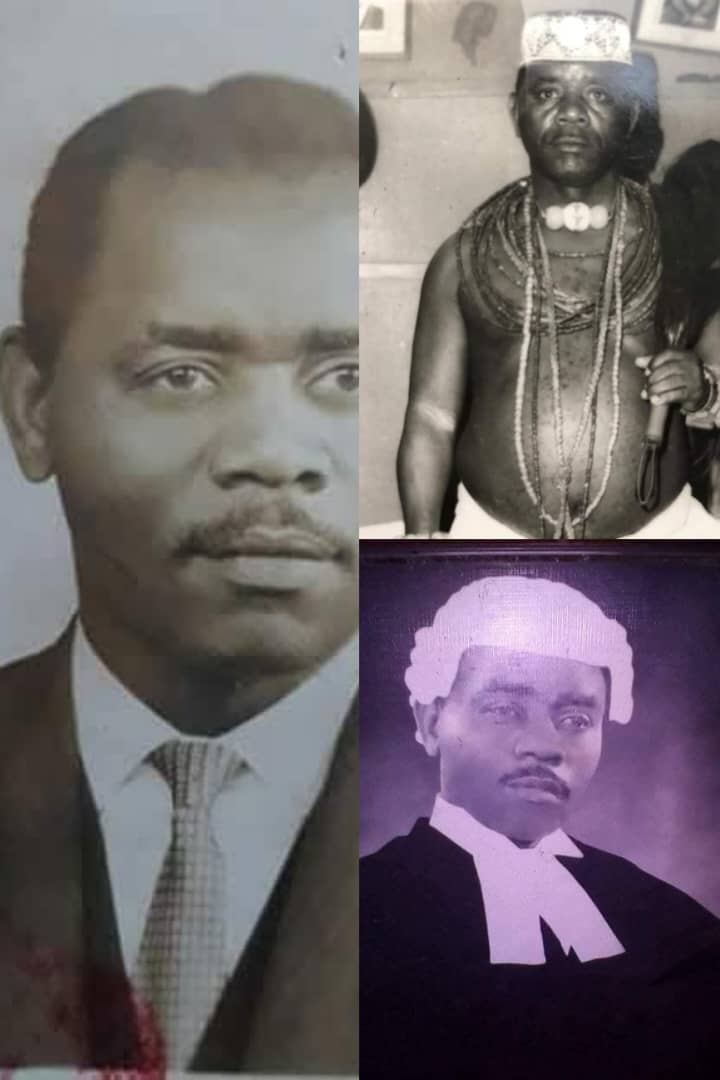
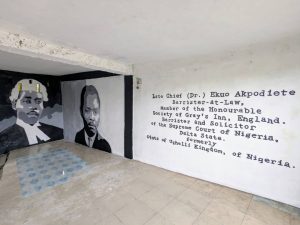
In a life of achievement, Chief Ekuogbe Akpodiete popularly called the Duke by his contemporaries in the UK was an assessment clerk, post office clerk, a court interpreter, an educationist, a business man, a political party chieftain, a Barrister and Solicitor, a Magistrate, the Otota (the Prime Minister) of Ughelli kingdom which is the highest traditional chieftaincy office that underpin the royal office of the Ovie of Ughelli Kingdom.
He was a trail blazer, a strict disciplinarian, a lover of people, and a philantropist. He saw to it that people lived in peace and happiness.
Born on the 4th of April, 1924, to parents cut from an industrious mould, Chief Ekuogbe Rowland Gregory Akpodiete took zealously to education that neither his mother Ughweriaka who was a trader, nor his father Akpodiete who was a farmer had.
He attended the Native Authority Primary School, Ughelli, and Enitona High School, Port Harcourt, for his secondary school education.
He thereafter had a brief teaching career in primary schools in Ofuoma near Ughelli, he worked as a process clerk in the then Sapele Township Department between 1950 and 1953, serving at the same time as an interpreter in the local courts.
He proceeded to the United Kingdom to seek the proverbial Golden Fleece where he worked and paid his way through, studying Law. He was admitted into the Honourable society of Gray’s Inn, England, in 1965, and shortly after, he returned home to Nigeria and attended the Nigerian Law School. He was called to the Nigerian Bar in 1966. He immediately started practice in Lagos. However, his practice in Lagos was regrettably abridged by the Nigerian Civil War, which drove him to his hometown Ughelli in 1967, where he continued to practise among his kith and kin as the first Legal Practitioner.
Chief Ekuogbe Akpodiete established himself in Ughelli. After the civil war, he served in the now defunct Mid-western State Judiciary from 1972 to 1975 as a Magistrate.
He was conferred with the chieftaincy title of Urhukperovie of Ughelli kingdom (the light of the King) by the then reigning Ovie of Ughelli, His Royal Highness Oharisi II of blessed memory in 1977.
In the quest for more knowledge, he went back to England for his Master’s degree in law (LL.M) and later a Ph.D. at the University of Warwick.
He was awarded an honourary doctorate degree (Ph.D) by Tenesse Christian University from the United States of America in 1991.
He became the Otota (the Prime Minister) of Ughelli Kingdom in 1986, an office he occupied until his demise on 9th April 1995.
Chief Ekuogbe Akpodiete was also politically involved. In the heady days of the Awolowo-led Unity Party of Nigeria, he was the party’s legal adviser in Ughelli and was on hand to assist during Chief Obafemi Awolowo’s campaign hosting in Ughelli and its environs.
In view of his love for people and entertainment, he established a popular cinema house, one of the first in Ughelli, known as REGA cinema, coined from his names, alongside an entertainment place called Unutakunu (people talk to people).
Chief Ekuogbe Akpodiete was blessed with wives and many children, grandchildren, and great grand children.
Mr. Olotu Akpodiete, PhD
Executive Director
Olotu & Ekuogbe Rowland Akpodiete foundation
Opinion
OF ABUJA INVESTMENT COMPANY, TAMUNO, WIKE, AND TINUBU’S “RENEWED HOPE” AGENDA
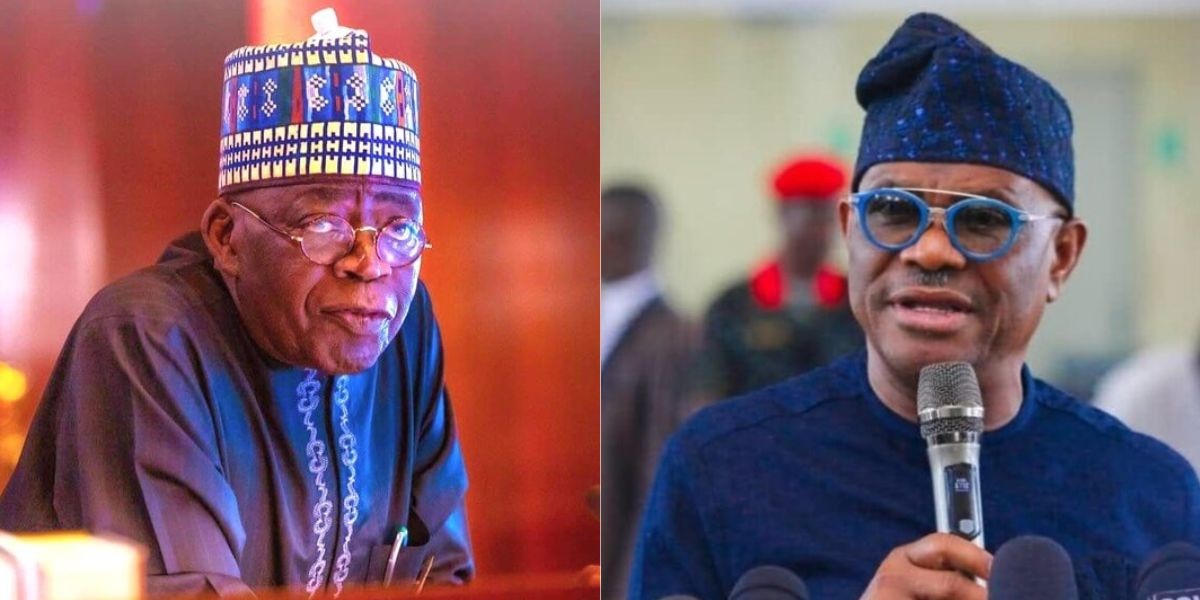
BY BOLAJI AFOLABI
Established in 1994 by the military administration of late General Sani Abacha, the Abuja Investments Company Limited, (AICL) is positioned as a government-owned investment enterprise charged with the responsibility to drive economic development in the federal capital territory. Its primary goal is to promote strategic investment and boost realistic economic growth of the FCT through different platforms and various approaches. Key functions of the AICL include Business Development; Investment and Development; Public-Private Partnership; Facility Management; and Infrastructure Development. The AICL has several subsidiaries and associates including Abuja Property Development Company, (APDC); Abuja Markets Management Limited, (AMML); Abuja Urban Mass Transport Company, (AUMTCO); Abuja Technology Village Free Zone; Abuja Film Village International Limited; PowerNoth/AICL Equipment Leasing Company. Others include Aso Savings and Loans PLC; Abuja Power Company Limited; Abuja Leasing Company; and Abuja Downtown Mall.
From 1994 till the exit of the military from national governance in 1999, the AICL recorded few achievements. During this period, the AUMTCO, and Aso Savings and Loans were established. With the dawn of democratic government in 1999, it was expected that the FCT, being an emerging federal capital will benefit hugely from the activities of the AICL. However, nothing much was achieved between 1999 and 2003. Somehow, Mallam Nasir El-Rufai, who administered the FCT from July 2003 to July 2007, was able to change the tide. Under his watch, the AICL came alive, recorded some measure of visibility and attracted positive public perception. Sadly, the AICL took a downward slide thereafter. None of the past ministers; Aliyu Modibbo Umar, Adamu Aliero, Bala Mohammed, and Muhammed Musa Bello provided the necessary political will and support for the AICL to maximally attain full potential. Indeed, it got worse between 2015 and May 2023 that many residents forgot that the company was still existing.
Many critical stakeholders were worried about the depth of neglect, static state, and institutional damage that the AICL was subjected to. Patterned after similar agencies in some developing nations, where measurable strides are achieved, the reverse happened with the AICL, that it became recurring causes of worries, and regrets to many people. Alhaji Aminu Mohammed, a former staff member of FCTA said, “it was shameful that the company remained largely dormant for many years.” Corroborating, Mr. Gilbert Gyang, an Abuja based investment expert declared, “the AICL, especially during the last administration was arguably comatose. It merely existed on paper, there was no visible investment initiative geared towards economic growth in the federal capital.” For Ms. Winifred Anosike, former banker, and development consultant, “it’s painful that the company was practically inactive for years. It was not only affecting economic growth in Abuja but impacted negatively on people and firms with result-driven initiatives who desired to contribute actively to the development of the capital city.”
With the emergence and subsequent inauguration of President Bola Tinubu on May 29, 2023, key players in the investment sector were hopeful that, the AICL may breathe again. Many hinged their thoughts on Tinubu’s background and experiences in accounting, financing, investment, governance, and leadership. Though with caveats; the choice of who minister’s FCT will be pivotal. Convinced that the AICL should be the “engine room” of economic growth and development of the capital city, many hoped that Tinubu will deploy the appropriate person to oversee the strategic ministry. Some stakeholders concluded that a wrong choice may consign the AICL into the “wilderness of inactivity” and likely extinction. Somehow, key players in the investment sector, at different fora and platforms were upbeat that Tinubu will pick the right person, who they hope will lead the way towards enabling the AICL to get back its mojo.
In August 2023, the deployment of Barrister Nyesom Ezenwo Wike as the Minister of the FCT; the 8th since Nigeria’s return to democratic government elicited public endorsement. Tinubu’s choice was largely celebrated by many stakeholders, as it renewed optimism about the prospects of AICL reviving its activities. Cognisant of Wike’s legendary achievements, as Rivers state Governor where he embarked on massive infrastructure development and more, turning the “Treasure Base” to the central investment hub in the South South zone, and emerging as second to Lagos state, many were confident that “light will come” to the AICL. A similar spate of enthusiasm and expectations was prevalent in and around the AICL. Many of the staff members also shared the positions.
The atmosphere at the Garki District offices of AICL on April 7, 2024 was ecstatic when news filtered in that Wike had appointed Dr. Maureen Tamuno as the Group Managing Director. A few hours later, it turned to frenzy after goggle checks were done by some staff members to have glimpses of her profile. Impressed, and satisfied with her multi-disciplinary academic background, and multi-faceted careers, her appointment was described as well-thought, and well-deserving. The unanimity of opinion was that, being a round peg in a round hole, the AICL will leverage on her far-reaching experiences and exposures as a former lawmaker, seasoned diplomat, public administrator, and boardroom strategist.
Aware and ready for the challenges ahead, many staff members were visibly excited when Tamuno assumed office the following day. Thus emerging as the first female chief executive of the AICL, since its 30 years of existence. Described as an accomplished technocrat with identifiable achievements in leadership, strategy, diplomacy, administration, and consulting, Tamuno, in her maiden speech confirmed the postulations of staff members. She emphasized her, “commitment to open-door policy to all staff, urging everyone to operate at the highest standard of transparency, confidentiality, accountability, and ethical business practices.” Continuing, she assured staff members that her, “strategic approach and consumer-centric philosophy are expected to propel the AICL to new heights of success.”
From reports, challenged by the enormity of the task ahead, conscious of the hugely untapped potential of the AICL, buoyed by the political support of Wike, and encouraged by the passion of the staff members, Tamuno literally hit the ground running. As a globally-recognized business development, management, and investment professional, she approached her assignment with iron-cast resolve, and the precision of a surgeon. First off, she embarked on critical reviews and overview of the AICL trajectory from inception; identified germane issues; evolved strategies for re-positioning the company; enunciated quick-wins, short-term, medium-term, and long-term measures for development, and some others. All these were geared towards delivering (or surpassing) the Ministerial mandate, and also ensuring that the AICL contributes its quota to Tinubu’s “Renewed Hope” agenda.
Indeed, it is imperative to note that the AICL, under the superintendent of Tamuno has literally drawn water out of rocks; which before now was largely unthinkable. That the soft-spoken and resourceful amazon; and her team were able to make noticeable impact within just one year, speaks volumes about her ingenuity, and indomitable spirit. In a broad sense, these achievements include encouraging economic diversification; expanding investment opportunities; exploring business and investment exchanges; deepening subsidiaries collaboration; and fostering diplomatic relationships.
In practical terms, the AICL, through some landmark initiatives has provided the platform for the promotion of trade and commerce, as well as economic growth and sustainable investment in the FCT. It is imperative to recall some of these laudable and trail-blazing projects. A few days back, the solar powered Farmers Market in Utako District and Kugbo International Market were commissioned by the FCT Minister of State, Dr. Mariya Mahmud. Speaking at the epoch making events, Mahmud eulogized Tamuno for completing the first-of-its-kind projects which, “would provide employment opportunities for a wide range of people in line with the “Renewed Hope” agenda.” While explaining that the projects are under the Public Private Partnership initiative of the AICL, Tamuno promised that, “under the Build Operate and Transfer (BOT) arrangement, the government will combine with the private sector to create profitable and sustainable public infrastructure. We identified Small and Medium Enterprises, (SMEs) as the backbone of any prosperous economy, because they create jobs that drive sustainable economic growth.” To underscore AICL’s commitment towards encouraging the informal sector, shops were gifted to some hardworking traders from all the six Area Councils of the FCT.
In October 2024, the AICL organized a two-day Abuja Business and Investment Summit with the theme: “Optimizing Investments Through Partnership.” The event, geared towards promoting investment opportunities in the FCT, was attended by major stakeholders in finance, investment, manufacturing, and other sectors. Participants opened new alliances, partnerships, and collaborations for new opportunities and innovations that will lead to micro and macro development. Tamuno, who by the way was one-time Nigeria’s Ambassador to Jamaica is leveraging on her diplomatic credentials and network to re-position the AICL. She is regularly engaging, and exploring investment opportunities with foreign countries through their diplomats in Nigeria. Through her participation at the maiden Nigeria-Kazakhstan Business Conference which was held in Abuja, in 2024, there are advanced plans for the establishment of city-to-city flights between both countries, as well as collaborations in agriculture, education, technology, logistics, and more.
Agreed, the journey is somewhat far but the AICL, under the new chief executive has shown unbridled commitment, and unflinching fervor in elevating the status, and relevance of the company towards engendering meaningful growth and development of the FCT. Tamuno has shown relentless drive and boundless energies towards justifying the confidence reposed in her by Wike. Posting an encouraging report-card in one year deserves commendations and encouragement. Mr. Olugbenga Okanlawon, an Abuja based public affairs analyst declared that, “she has shown that she is the right person for the job. Considering what the AICL has achieved in one year, it is clear that more grounds will be covered in terms of growth and development.” A frequent caller to the AICL who preferred anonymity said, “the GMD has brought a new lease of life to the place, and everybody has imbibed her can-do-it spirit with much pride, and belief.”
* BOLAJI AFOLABI, a Development Communications specialist was with the Office of Public Affairs, The Presidency, Abuja.
Opinion
Dismantling the false Narrative of a “Coup” in Rivers State
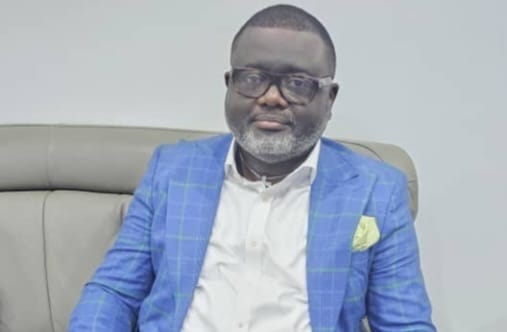
By Jones Onyereri
The assertions that President Tinubu’s intervention in Rivers State constitutes an unconstitutional power grab or a “military coup in civilian disguise” fundamentally misrepresent the legal, political, and security realities that necessitated federal action. Far from being a partisan maneuver, the declaration of a state of emergency and subsequent measures were lawful, proportionate, and grounded in the imperative to prevent a total collapse of governance and public order. Below is a thorough rebuttal to the allegations:
The Nigerian Constitution explicitly empowers the President to declare a state of emergency under Section 305 when there is a clear threat to public safety or a breakdown of governance. The escalation of pipeline vandalism by militants—which crippled economic activity, endangered lives, and exacerbated environmental degradation—coupled with the Supreme Court’s February 18 judgment highlighting governance failures in Rivers State, provided incontrovertible justification for federal intervention. The claim that “no emergency existed” ignores the state government’s demonstrable inaction in addressing these threats, which risked spiraling into wider violence. Emergency powers are, by design, temporary and exceptional, aimed at restoring stability, not undermining democracy.
The appointment of Admiral Ibok-Ete Ibas as Sole Administrator aligns with constitutional provisions for federal intervention during crises. Section 11 of the Constitution permits the National Assembly to legislate for a state in extraordinary circumstances, and the President’s action enjoys implicit legislative backing as a stopgap to avert anarchy. Admiral Ibas, a retired military officer with no overt political ties, was selected for his administrative expertise, not as a proxy for any faction. His mandate is strictly limited to stabilizing the state, facilitating the return to democratic governance, and ensuring the security forces can operate without partisan interference. To equate this with a “military coup” is hyperbolic and disregards the transparent, legal framework guiding his role.
Critics allege defiance of Supreme Court orders regarding state funds, but this misinterprets the interplay between judicial mandates and emergency executive authority. While the Court initially restricted financial flows to Rivers State due to governance disputes, the escalation of the crisis necessitated federal release of funds under the “doctrine of necessity” to sustain critical services like healthcare, education, and infrastructure. The Constitution prioritizes the security and welfare of citizens (Section 14(2)(b)), and the President’s duty to uphold this principle supersedes rigid adherence to procedural norms during emergencies.
The Sole Administrator’s actions, including the formulation of regulations and restructuring of local government administrations, operate within the bounds of his provisional mandate. These regulations require approval by the Federal Executive Council (FEC), ensuring oversight and accountability. The replacement of local government officials was not a “power grab” but a necessary step to dismantle networks complicit in revenue diversion or inefficiency. The Supreme Court’s insistence on democratically elected local governments remains sacrosanct, but interim appointments during emergencies are globally recognized mechanisms to restore functionality before elections can be organized.
Claims that the Administrator has overstepped by preparing a budget or appointing a Secretary to the State Government (SSG) ignore the practical realities of governance. In the absence of a functional State Assembly, provisional budgets based on existing frameworks ensure continuity of public services. Similarly, the appointment of an SSG—a routine administrative role—falls within the Administrator’s authority to maintain bureaucratic operations. These measures are neither permanent nor unconstitutional; they are transitional tools to prevent total institutional paralysis.
The narrative that this intervention serves Minister Wike’s political interests is speculative and distracts from its stated purpose. Restructuring boards and commissions, including the Rivers State Electoral Commission, aims to depoliticize institutions vital to free and fair elections. The focus on “Wike loyalists” assumes nefarious intent without evidence, whereas the Administrator’s appointments could equally reflect efforts to engage experienced personnel familiar with the state’s administrative landscape. The assertion that federal actions target Governor Fubara’s allies conflates routine accountability with persecution; in crises, restructuring is inevitable to eliminate inefficiency or bias.
Regarding the House of Assembly reconstruction, federal involvement ensures the project adheres to timelines and standards, avoiding further delays that could destabilize legislative functions. The Governor’s progress, while commendable, does not negate the need for independent oversight in a volatile environment.
President Tinubu’s intervention is neither indefinite nor authoritarian. Emergency measures will lapse once security is restored, and democratic structures are reinstated. The National Assembly retains the authority to review and curtail these actions under Section 11, ensuring checks and balances. To frame this as a “2027 political takeover” is a cynical distortion of a lawful, necessary intervention to prevent Rivers State from descending into chaos.
In conclusion, the allegations of a “civilian coup” or unconstitutional power grab disregard the constitutional safeguards and urgent pragmatic considerations guiding federal actions. The President’s duty to protect lives and livelihoods in Rivers State transcends political expediency. While vigilance against overreach is prudent, dismissing all stabilization efforts as partisan machinations undermines the legitimate pursuit of peace and order. The people of Rivers State deserve functional governance, not perpetual crisis—and federal intervention, however imperfect, is a constitutional means to that end.
Rt Hon Sir Jones Onyereri PhD, KSP, FCIPAN
April 12, 2025
-

 News22 hours ago
News22 hours agoAutonomy: 774 LGs challenge FG, states in court Tuesday
-

 News15 hours ago
News15 hours agoJust in: Namibia Moves to Deport Over 500 Americans in Bold Visa Policy Shift
-

 News15 hours ago
News15 hours agoRivers women rally in support of state of emergency
-

 News10 hours ago
News10 hours agoYou must refund N300m, Rivers State tells NBA
-
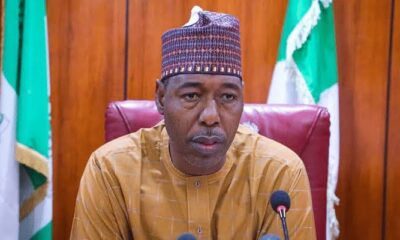
 News22 hours ago
News22 hours agoZulum orders arrest, offers house, scholarship to abused boy in viral video
-

 Politics13 hours ago
Politics13 hours agoBwala accuses Senator Ndume of plans to defect from APC
-

 Foreign11 hours ago
Foreign11 hours agoUS orders 30-day registration for all foreign nationals or face jail, deportation
-
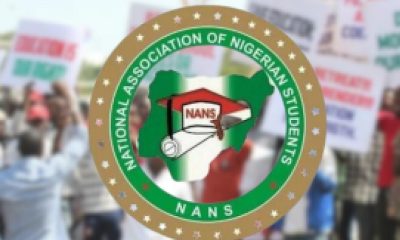
 News23 hours ago
News23 hours agoNANS criticize NASS over proposed bill to fine, jail non voters






